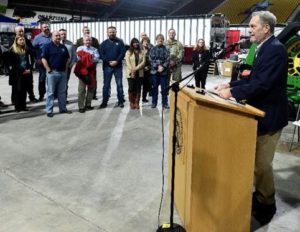Jan 24, 2020EPA moves to replace WOTUS with new Navigable Waters Protection Rule
On Jan. 23, the EPA and the Department of the Army finalized the Navigable Waters Protection rule to define “Waters of the United States” and thereby establish federal regulatory authority under the Clean Water Act.
For the first time, the agencies are streamlining the definition so that it includes four simple categories of jurisdictional waters, provides clear exclusions for many water features that traditionally have not been regulated, and defines terms in the regulatory text that have never been defined before. Congress, in the Clean Water Act, explicitly directed the Agencies to protect “navigable waters.” The Navigable Waters Protection Rule to define “Waters of the United States” regulates these waters and the core tributary systems that provide perennial or intermittent flow into them. Read the pre-publication version of the final Navigable Waters Protection Rule.
U.S. Secretary of Agriculture Sonny Perdue praised the EPA for defining the Waters of the United States (WOTUS) rule with the Navigable Waters Protection Rule:
“President Trump is restoring the rule of law and empowering Americans by removing undue burdens and strangling regulations from the backs of our productive farmers, ranchers, and rural land-owners. The days are gone when the Federal Government can claim a small farm pond on private land as navigable waters,” Perdue said. “I thank President Trump and Administrator Wheeler for having the backs of our farmers, ranchers, and producers and for continuing to roll back Federal overreach. With reforms and deregulation, Americans once again have the freedom to innovate, create, and grow.”
“On Jan. 23, 2020, the EPA and the Department of the Army (Army) fulfilled yet another promise of President Trump by finalizing the Navigable Waters Protection Rule to define ‘waters of the United States’ (WOTUS). For the first time, the agencies are streamlining the definition so that it includes four simple categories of jurisdictional waters, provides clear exclusions for many water features that traditionally have not been regulated, and defines terms in the regulatory text that have never been defined before. Congress, in the Clean Water Act, explicitly directed the Agencies to protect ‘navigable waters.’ The Navigable Waters Protection Rule regulates these waters and the core tributary systems that provide perennial or intermittent flow into them. The final rule fulfills Executive Order 13788 and reflects legal precedent set by key Supreme Court cases as well as robust public outreach and engagement, including pre-proposal input and comments received on the proposed rule.
The Navigable Waters Protection Rule protects the environment while respecting states, localities, tribes, and private property owners. It clearly delineates where federal regulations apply and gives state and local authorities more flexibility to determine how best to manage waters within their borders. Assertions have been made that the new rule will reduce jurisdiction over thousands of stream miles and millions of acres of wetlands. These assertions are incorrect because they are based on data that is too inaccurate and speculative to be meaningful for regulatory purposes. The final rule along with state, local and tribal regulations and programs provide a network of protective coverage for the nation’s water resources.”
National Potato Council responds
Leaders of the National Potato Council welcomed the announcement that the U.S. Environmental Protection Agency (EPA) finalized its proposed rule defining the Waters of the United States (WOTUS) rule with the Navigable Waters Protection Rule. EPA’s action also defines what waters are not subject to federal control, including most farm and roadside ditches, prior converted cropland, and farm and stock watering ponds.
“Potato farmers are committed to protecting the nation’s waters,” said Britt Raybould, President of the National Potato Council. “However, the imposition of unnecessary federal burdens, such as regulating ditches on private farms that are generally dry throughout the year, undermines that overall mission by creating uncertainty and increasing costs. EPA’s newly issued rule avoids those negative outcomes and provides increased clarity regarding the responsibilities of farmers under the Clean Water Act in protecting our nation’s surface water resources.”
NPC Vice President of Environmental Affairs Dominic LaJoie also welcomed the news. “NPC appreciates EPA and the Army Corps of Engineers for issuing a final rule defining what waters are subject to the permitting authority under the Clean Water Act. While we are still reviewing the rule, it appears that the federal agencies have adopted a common-sense approach in determining the act’s scope. It recognizes the authority of the states to continue to manage their waters while providing the federal government appropriate authority to protect navigable waters,” said LaJoie.

NPC Vice President of Legislative Affairs RJ Andrus and NPC Chief Operating Officer Mike Wenkel joined state and local partners at an event (Jan. 23) with Rep. Mike Simpson (R-Idaho, pictured right) at the Idaho Potato Conference & Ag Expo announcing the new rule. The event was one of many that occurred throughout the country held by members of Congress and federal officials welcoming the rule.
The revised WOTUS definition identifies four clear categories of waters that are federally regulated under the Clean Water Act: the territorial seas and traditional navigable waters; perennial and intermittent tributaries; certain lakes, ponds, and impoundments; and wetlands that are adjacent to jurisdictional waters. Importantly, the final action also details what waters are not subject to federal control, including features that only contain water in direct response to rainfall; groundwater; many ditches, including most farm and roadside ditches; prior converted cropland; farm and stock watering ponds; and waste treatment systems.
To learn more about EPA’s WOTUS Rule, click here.














